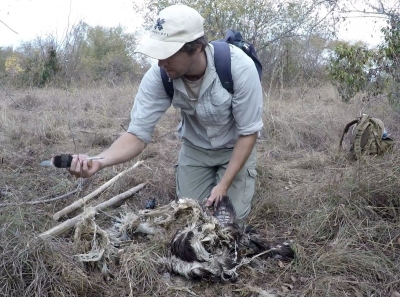Martial Eagle filmed for TV series found dead


Stever Backshall (left) and Rowen van Eeden (right) fitting a Martial Egalge with GPS telemtery. Photo: ITV/ Shiver
The 4.6 kg female Martial Eagle debuted on British television earlier this month in a nature documentary narrated by well-known TV presenter Steve Backshall. The bird was fitted with an electronic tag under the watchful eye of the British film crew, who were documenting scientists' efforts to stem the decline of these rare predatory birds. However, in a sad turn of events, and only a few weeks later, the feathered star of the show has been found dead in a hunter’s snare in rural Mozambique - illustrating the risks that these birds face and highlighting a potential factor contributing to this species’ decline.
“We detected that the bird was no longer moving about in a normal fashion,” said Rowen van Eeden from the Percy FitzPatrick Institute of African Ornithology Centre of Excellence at the University of Cape Town. Van Eeden and a colleague duly set off to the bird's last-known location, 160 km away from where the bird was tagged, in a remote corner of neighbouring Mozambique which is currently in the midst of renewed civil unrest. The team had to battle through inhospitable terrain where access by vehicles is limited and the dense bushveld makes travelling difficult. “We followed the Cahora Bassa power line as far as possible, which was meant to help us get to the location faster but we still had to dig our 4x4 out of thick river sand twice!” van Eeden said. An hour walk into the bush led the team to a small game trail. “The first thing I picked up on close to the trail was the smell of something dead and at that point I knew our eagle might be very close,” van Eeden said. After searching through the long grass the team spotted the eagle’s tail sticking up between two bushes, with its neck firmly trapped in a snare likely set to catch small antelope.
Explained van Eeden: “Obviously it was a very emotional experience seeing an animal you are so passionate about in that situation, but the importance of finding an individual that would otherwise have gone undetected without our tracking brought home how important our research is for the species’ conservation.” Most small Mozambican villages rely on cattle herding, subsistence farming, and hunting to survive. This is the third adult eagle out of eight fitted with GPS tags to die outside of Kruger since the start of Martial Eagle research in the world-famous Park three years ago. Two have now died at the hands of hunters in Mozambique and one was electrocuted after flying into power lines in another neighbouring country, Swaziland.

Rowen van Eeden and teh remains of the once majestic Martial Eagle caught in a snare. Photo: Gareth Tate
By confirming the cause and precise location of death, researchers will be better able to understand the reasons for the rapid decline of Africa's largest eagle even in protected areas. Van Eeden said the UCT study was specifically trying to determine how Kruger's Martial Eagle population could have declined by as much as 54% over the past 20 years: “One of our ideas for the population decline was that young eagles would range widely during their dispersal, beyond the safety of protected areas like KNP and face high rates of unnatural mortality, meaning that in time there would be fewer new birds to enter the breeding population”
However the latest fatality in Mozambique suggested adult eagles also range widely, and are therefore also at risk. “Surprisingly, what we have also noticed is that some of our adult birds fitted with GPS tags which we would think would be resident in KNP also travel large distances and are facing high rates of mortality beyond protected areas” said Dr. Arjun Amar, a senior lecturer at UCT and the project’s principle investigator. These findings suggest that even the largest protected areas may be insufficient to conserve wide ranging predators and conservation efforts may be needed beyond protected area boundaries in order to safeguard such species.
